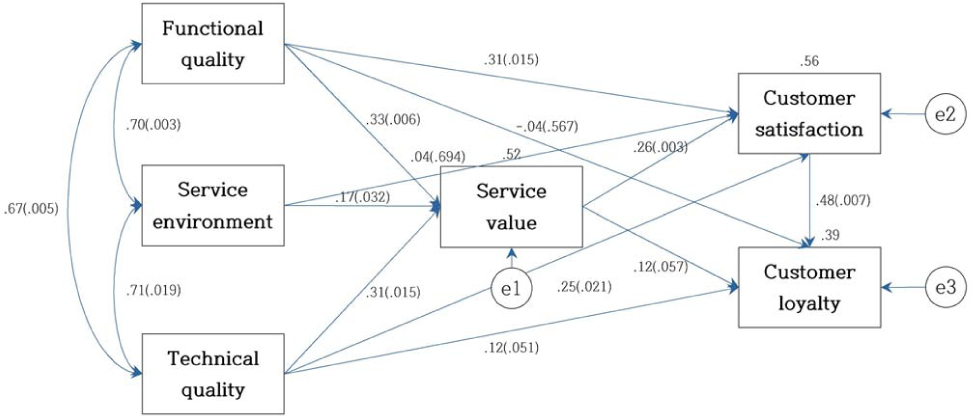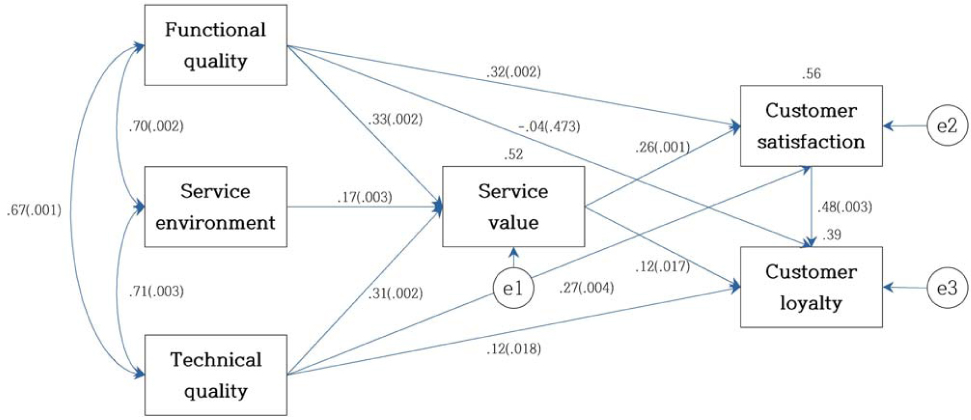J Korean Acad Nurs Adm.
2010 Dec;16(4):497-506.
Causal Relationships among Quality, Service Value, Satisfaction and Loyalty
- Affiliations
-
- 1Department of Nursing, Chung-Ang University, Korea. yhyom@cau.ac.kr
Abstract
- PURPOSE
The purpose of this study was to examine the causal relationships among quality of health care service, service value, satisfaction and loyalty as perceived by hospital inpatients.
METHODS
A survey using a structured questionnaire was conducted with 654 hospital inpatients. Analysis of the data was done with both SPSS Win 17.0 for descriptive statistics and AMOS 18.0 for the structural equation model.
RESULTS
The modified model yielded Chi-square=7.96 (p=.019), df=2, chi2/df=3.98, GFI=.99, AGFI=.96, RMSEA=.07, NFI=.99, CFI=.99, TLI=.98 and showed good fit indices. Three dimensions of quality had significant direct effects on service value. Functional quality, technical quality and service value had significant direct effects on customer satisfaction. Technical quality, service value, and customer satisfaction had significant direct effects on customer loyalty.
CONCLUSION
These results suggest that quality of health care is an important element in service value, and through both quality and service value, customer satisfaction and customer loyalty can be enhanced. Further study with a larger sample from various hospitals and a longitudinal design is necessary.
Figure
Reference
-
1. Baker J. The effect of retail store environment on consumer perceptions of quality, price, and value. 1990. University of Texas at Austine;Unpublished doctoral dissertation.2. Brady MK, Cronin JJ. Some new thoughts on conceptualizing perceived service quality: A hierarchical approach. J Mark. 2001. 65(3):34–49.
Article3. Choi KS, Cho WH, Lee S, Nam JM. Structural modeling of quality, satisfaction, value and purchase intention in health care service. Korean J Prev Med. 2000. 33(4):426–435.4. Cronin JJ, Taylor SA. Measuring service quality: a reexamination and extension. J Mark. 1992. 56(3):55–68.
Article5. Czepiel JA, Gilmore R. Czepiel JA, Shanahan J, editors. Exploring the concept of loyalty. Services marketing challenge: Integrating for competitive advantage. 1987. Chicago, IL: AMA;91–94.6. Gremler DD. The effect of satisfaction, switching costs, and interpersonal bonds on service loyalty. 1995. Arizona: Arizona State University;Unpublished doctoral dissertation.7. Grönroos C. Strategic management and marketing in the service sector. 1982. Helsinfors: Swedish School of Economics and Business Administration.8. Han SS, Son IS, Gu JC, Lee SC. The study on the effect of health care service quality upon customer loyalty: Based upon SERVPERF. J Korean Soc Quality Manage. 2007. 35(1):61–72.9. Hwang YC. The impact of service quality context on service quality and business performance in the hospital industry. Consumption Cult Study. 2006. 9(2):49–77.10. Jacoby J, Kyner DB. Brand loyalty vs repeat purchasing behavior. J Mark Res. 1973. 10(1):1–9.
Article11. Jung MS, Youn MJ. A study on the consumers' expectation, perception, quality, and satisfaction with the industrial nursing services. J Korean Community Nurs. 2001. 12(3):570–581.12. Kang BS, Cho CH, Kim SH. Effect of service quality on customer satisfaction and performance in the small and the medium hospital. Korean Small Bus Rev. 2005. 27(1):57–87.13. Kim KS. Analysis structural equation modeling: AMOS 4. 2001. Seoul: SPSS Academy.14. Kim YK, Jung KT, Ann YS, Lee SE, Jang YH, Han BR. The influence of dental service qualities on the patient satisfaction and royalty in dental clinics and hospitals. Korean J Hosp Manage. 2003. 8(3):49–71.15. Kim HK. Study on the structural relationship of customers' satisfaction, value, loyalty, and image by utilizing the discordance of service quality and expectation. 2006. Seoul: Kyung Hee University;Unpublished doctoral dissertation.16. Lee SC, Kim YK, Chang SG, Han SS. Determinants affecting patients loyalty in medical service: An empirical study on comparision with in-patients and out-patients using multi-group structural equation model. Korean J Hosp Manage. 2008. 13(4):76–100.17. Lee SC, Lee HJ, Jung SH. Analysis of relating factors with customer loyalties in medical services. Korean J Health Policy Adm. 2005. 15(2):37–52.
Article18. Lee MA, Yom YH. A comparative study of patients' and nurses' perceptions of the quality off nursing services, satisfaction and intent to revisit the hospital: A questionnaire survey. Int J Nurs Stud. 2007. 44(4):545–555.
Article19. Oliver RL. Satisfaction: A behavioral perspective on the consumer. 1997. New York: McGraw-Hill.20. Parasuraman A, Zeithaml VA, Berry LL. SERVQUAL: A multiple-item scale for measuring consumer perception of service quality. J Retail. 1988. 64(1):12–40.21. Park JS. The causal relationship of hospital inpatient's perceived quality, satisfaction, service value, and intention to revisit. Korean J Hosp Manage. 2002. 7(4):123–151.22. Prichard MP, Howard DR. The loyal traveler: examining a typology of service patronage. J Travel Res. 1997. 35(4):2–10.
Article23. Rho JO. An empirical study on the effect of medical service value on the medical customer satisfaction. 2001. Kyungsung University;Unpublished doctoral dissertation.24. Rust RT, Oliver RL. Rust RT, Oliver RL, editors. Service quality: Insights and managerial implications from the frontier. Service quality: New directions in theory and practice. 1994. Thousand Oaks CA: Sage Publications;25–280.
Article25. Seol DW, Yu SH, Park EC, Kim ES. Factors related to willingness of choosing the same hospital. Korean J Hosp Manage. 1997. 2(1):65–79.26. Woodside AG, Frey LL, Daly RT. Linking service quality, customer satisfaction, and behavior intention. J Health Care Mark. 1989. 9(4):5–17.27. Yom YH, Lee MA. Influencing factors on customer loyalty in nursing homes. J Korean Acad Nurs Adm. 2009. 15(3):455–462.28. Yoo DK, Suh SW. The effect of medical service quality and perceived risk on customer satisfaction, repurchase intention, and churn intention as to hospital sizes. J Korea Serv Manage Soc. 2009. 10(3):97–130.
Article29. Zeithaml VA, Bitner MJ. Services marketing. 1998. New York: McGraw-Hill.
- Full Text Links
- Actions
-
Cited
- CITED
-
- Close
- Share
- Similar articles
-
- A Study on Service Quality and Customer Loyalty of Foodservice Industry
- The Causality among the Internal Customer Satisfaction, the External Customer Satisfaction and the Customer Loyalty of Medical Service
- The Effects of Customer Expectations & Satisfaction on Customer Loyalty in Restaurants
- Factors Influencing Chinese Customers' Loyalty to Korean Medical and Tourism Services
- Effect of the Service Providers' Perceived Service Quality on Customer Loyalty in Restaurants



